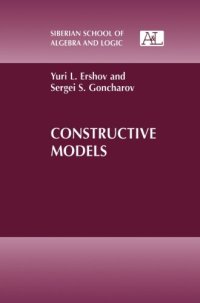
Ebook: Constructive Models
Author: Yuri L. Ershov Sergey Goncharov
- Tags: Machine Theory, AI & Machine Learning, Computer Science, Computers & Technology, Algorithms, Data Structures, Genetic, Memory Management, Programming, Computers & Technology, Programming Languages, Ada, Ajax, Assembly Language Programming, Borland Delphi, C & C++, C#, CSS, Compiler Design, Compilers, DHTML, Debugging, Delphi, Fortran, Java, Lisp, Perl, Prolog, Python, RPG, Ruby, Swift, Visual Basic, XHTML, XML, XSL, Computers & Technology, Reference, Almanacs & Yearbooks, Atlases & Maps, Careers, Catalogs & Directories, Consumer Guides
- Series: Siberian School of Algebra and Logic
- Year: 2012
- Publisher: Springer
- Edition: Softcover reprint of the original 1st ed. 2000
- Language: English
- pdf
The theory of constructive (recursive) models follows from works of Froehlich, Shepherdson, Mal'tsev, Kuznetsov, Rabin, and Vaught in the 50s. Within the framework of this theory, algorithmic properties of abstract models are investigated by constructing representations on the set of natural numbers and studying relations between algorithmic and structural properties of these models.
This book is a very readable exposition of the modern theory of constructive models and describes methods and approaches developed by representatives of the Siberian school of algebra and logic and some other researchers (in particular, Nerode and his colleagues). The main themes are the existence of recursive models and applications to fields, algebras, and ordered sets (Ershov), the existence of decidable prime models (Goncharov, Harrington), the existence of decidable saturated models (Morley), the existence of decidable homogeneous models (Goncharov and Peretyat'kin), properties of the Ehrenfeucht theories (Millar, Ash, and Reed), the theory of algorithmic dimension and conditions of autostability (Goncharov, Ash, Shore, Khusainov, Ventsov, and others), and the theory of computable classes of models with various properties.
Future perspectives of the theory of constructive models are also discussed. Most of the results in the book are presented in monograph form for the first time.
The theory of constructive models serves as a basis for recursive mathematics. It is also useful in computer science, in particular, in the study of programming languages, higher level languages of specification, abstract data types, and problems of synthesis and verification of programs. Therefore, the book will be useful for not only specialists in mathematical logic and the theory of algorithms but also for scientists interested in the mathematical fundamentals of computer science.
The authors are eminent specialists in mathematical logic. They have established fundamental results on elementary theories, model theory, the theory of algorithms, field theory, group theory, applied logic, computable numberings, the theory of constructive models, and the theoretical computer science.
This book is a very readable exposition of the modern theory of constructive models and describes methods and approaches developed by representatives of the Siberian school of algebra and logic and some other researchers (in particular, Nerode and his colleagues). The main themes are the existence of recursive models and applications to fields, algebras, and ordered sets (Ershov), the existence of decidable prime models (Goncharov, Harrington), the existence of decidable saturated models (Morley), the existence of decidable homogeneous models (Goncharov and Peretyat'kin), properties of the Ehrenfeucht theories (Millar, Ash, and Reed), the theory of algorithmic dimension and conditions of autostability (Goncharov, Ash, Shore, Khusainov, Ventsov, and others), and the theory of computable classes of models with various properties.
Future perspectives of the theory of constructive models are also discussed. Most of the results in the book are presented in monograph form for the first time.
The theory of constructive models serves as a basis for recursive mathematics. It is also useful in computer science, in particular, in the study of programming languages, higher level languages of specification, abstract data types, and problems of synthesis and verification of programs. Therefore, the book will be useful for not only specialists in mathematical logic and the theory of algorithms but also for scientists interested in the mathematical fundamentals of computer science.
The authors are eminent specialists in mathematical logic. They have established fundamental results on elementary theories, model theory, the theory of algorithms, field theory, group theory, applied logic, computable numberings, the theory of constructive models, and the theoretical computer science.
Download the book Constructive Models for free or read online
Continue reading on any device:

Last viewed books
Related books
{related-news}
Comments (0)